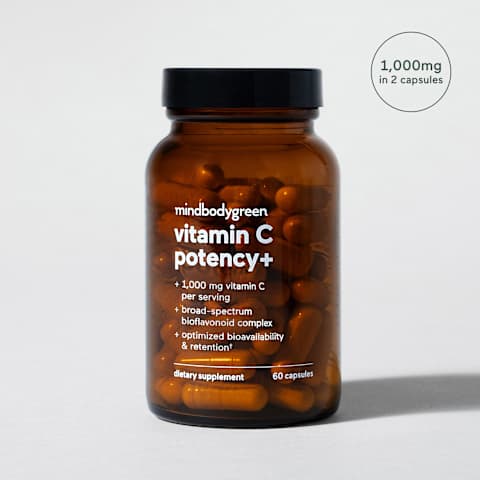Advertisement
You Should Be Taking A Vitamin C Supplement Daily: True Or False?



If you're the type of person that starts to load up on vitamin C supplements only when your child comes home from school looking admittedly crummy and indisposed or when several co-workers call out the same week, you may be wondering why in the world you would need to worry about taking vitamin C daily if you're feeling fine.
Although vitamin C is incredibly helpful (actually critically needed) in supporting both innate and adaptive immune system functions and responses, this essential nutrient helps with a truly wide array of daily physiological pathways and systems and shouldn't be pigeonholed as a partisan of the immune system.*
What is vitamin C?
As mentioned above, vitamin C is an essential nutrient—meaning the body cannot produce vitamin C on its own and it must be consumed through diet instead (every day).
While vitamin C's support in immune function and resilience is much appreciated, this potent antioxidant is involved in a number of other daily, complex biological pathways that support the heart, brain, skin, joints, eyes, and more.*
How vitamin C is used in the body daily
"Vitamin C is used as a cofactor in over a dozen different enzymes in the body to help build molecules we need to survive,"* explains Alexander Michels, Ph.D., clinical research coordinator at the Linus Pauling Institute. For survival: Chew on that for a minute.
As the body's primary water-soluble antioxidant, vitamin C has a very important role to play. "Vitamin C acts as a potent antioxidant and is able to scavenge a wide variety of reactive oxygen species,"* notes Anitra Carr, Ph.D., director of the Nutrition in Medicine Research Group at the University of Otago.
Its antioxidant activity takes place in both intracellular fluid (the cytoplasm within a cell) and extracellular fluid (the fluid outside of cells, such as blood plasma).*
Vitamin C works as a free radical scavenger, a powerhouse nutrient that increases blood antioxidant levels to help balance the body's oxidative stress levels1—all of which protect cells and promote cellular resilience throughout the body.*
Beyond its role in antioxidant capacity and redox balance, vitamin C also directly aids in or is required for the following physiological processes:*
- Iron absorption
- Amino acid and carbohydrate metabolism (i.e., to create energy from the foods we eat)
- Fat and protein synthesis
- Neurotransmitter synthesis
- Red blood cell production and oxygen transport
- Collagen synthesis and preservation
- Tissue growth, development, and repair
Our bodies require these diverse and paramount biological functions daily, and sufficient vitamin C levels available in the body are vital to their success.*
Do I need daily vitamin C supplementation?
Vitamin C is available in a number of fruits and vegetables—such as citrus fruits, cruciferous veggies, kiwis, strawberries, potatoes, and more.
When practicing mindfulness with your diet, it can be quite easy to reach a vitamin C intake of 90 milligrams (for men) and 75 milligrams of vitamin C (for women) each day, as recommended by the National Academies2. (Note: Vitamin C needs increase during pregnancy and lactation to 85 and 120 milligrams, respectively.)
However, 46% of U.S. adults3 are failing to reach the optimal intake from food alone—which means there's about a 50/50 chance you're not getting enough vitamin C from your daily meals. (Not the best of odds, if we're being honest.)
Luckily, not only can a high-quality vitamin C supplement help bridge those nutrient gaps, but it can support the multidimensional applications of C that your body needs to survive and, better yet, thrive.*
What should I look for in a vitamin C supplement?
As far as dosage goes, a high-potency serving of 1,000 milligrams is not only backed by research4 but is a meaningful quantity of vitamin C to provide all the C your body needs to carry out daily activities.* It's also important to find a high-quality vitamin C supplement with optimal form and function.
There are many different types of vitamin C used in supplements—including ascorbic acid, vitamin C/lipid/citrus bioflavonoid complex (such as PureWay-C™), food-derived vitamin C (e.g., acerola fruit), calcium ascorbate, liposomal, and calcium ascorbate-calcium threonate-dehydroascorbate (Ester-C).
When looking at lower-dose quantities (i.e., less than about 400 milligrams), these forms don't drastically differ from each other.
For example, ascorbic acid is a very common (and useful) form of vitamin C found in many foods and supplements. When that dosage is increased, however, a process called passive diffusion results in a large portion of ascorbic acid (and the other forms of vitamin C listed above) potentially going unused. Here's a more detailed science breakdown on this topic, in case you're curious.
In other words, when it comes to high-potency dosages, optimizing bioavailability to increase the absorption of vitamin C is crucial.
In high-potency doses, PureWay-C™ has evidence and clinical advantage rooted in science at the 1,000-milligram dose. This scientifically advanced complex features lipid and citrus bioflavonoid built-in absorption technology, to help chauffeur vitamin C into cells more efficiently and protect it from oxidation, resulting in a 233% higher cellular uptake and retention5 of vitamin C than ascorbic acid and a 122% increase compared to Ester-C.*†
When contrasting these four forms of vitamin C, PureWay-C™ is absorbed faster5, results in greater serum vitamin C levels6 (i.e., blood levels to achieve vitamin C sufficiency), and even achieves the most impactful anti-inflammatory and antioxidant benefits as measured by key biomarkers in the body.*†
If you're looking for a high-quality vitamin C supplement that serves up a high dose of vitamin C with built-in bioflavonoids and lipids to optimize absorption and bioefficacy in the body, mindbodygreen's vitamin C potency+ is the supplement for you.*
The takeaway.
You shouldn't wait until your immune system is kicking into high gear to introduce vitamin C.
A vitamin C supplement can help support your body's antioxidant strength, plus immune, cognitive, and skin health, each and every day—and thanks to its innovative ingredients, vitamin C potency+ has the superior bioavailability, retention, and action to make sure your body gets the C boost it craves.*
If you are pregnant, breastfeeding, or taking medications, consult with your doctor before starting a supplement routine. It is always optimal to consult with a health care provider when considering what supplements are right for you.
6 Sources
- https://www.ncbi.nlm.nih.gov/labs/pmc/articles/PMC297842/
- https://www.ncbi.nlm.nih.gov/books/NBK225480/
- https://www.ncbi.nlm.nih.gov/labs/pmc/articles/PMC7352522/
- https://www.ncbi.nlm.nih.gov/labs/pmc/articles/PMC7589163/
- https://pubmed.ncbi.nlm.nih.gov/17901843/
- https://pubmed.ncbi.nlm.nih.gov/18971870/
